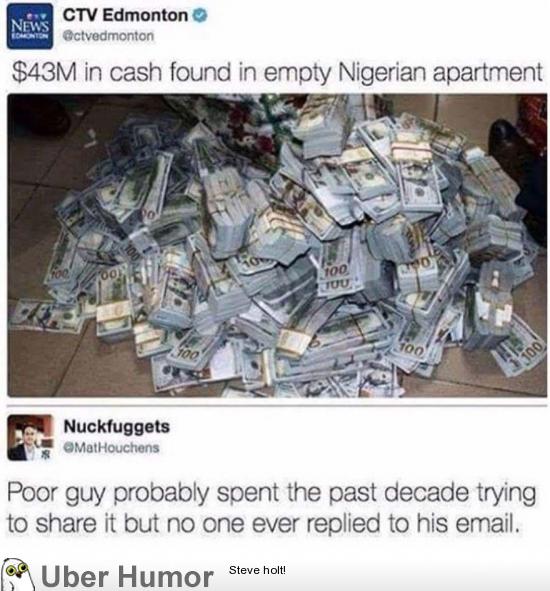The "Prince of Nigeria" meme has become one of the most iconic internet phenomena, sparking both laughter and curiosity worldwide. This legendary email scam, originating from Nigeria, has evolved into a cultural touchstone. Despite its humorous connotations, the scam's origins and impact deserve serious attention. In this article, we will delve into the story behind the Prince of Nigeria meme, its evolution, and its broader implications.
The Prince of Nigeria scam, also known as the "419 scam," takes its name from the section of the Nigerian criminal code that addresses fraud. It has been around for decades, but its transformation into a meme has brought it to the forefront of internet culture. Through this article, we aim to explore the history, psychology, and cultural significance of this phenomenon.
Whether you're familiar with the meme or just curious about its origins, this article will provide a comprehensive look at the Prince of Nigeria meme. From its roots in traditional Nigerian scams to its place in modern internet culture, we'll uncover the layers of this fascinating topic.
Read also:How To Find The Correct Phone Number For Walmartcom A Complete Guide
Table of Contents
- Biography of the "Prince"
- The History of the Prince of Nigeria Scam
- Scam Techniques Used in the Prince of Nigeria Scam
- The Evolution of the Prince of Nigeria Meme
- The Role of the Meme in Internet Culture
- Psychology Behind Falling for the Scam
- Legal Implications and Crackdowns
- Statistics on the 419 Scam
- How to Prevent Falling Victim to the Scam
- Conclusion: The Legacy of the Prince of Nigeria Meme
Biography of the "Prince"
The "Prince of Nigeria" is not a real person but rather a fictional character created by scammers. However, to understand the meme's origins, we must examine the cultural and historical context that gave rise to it. Below is a summary of the "Prince's" fictional persona:
Biographical Data
| Name | Prince Nwoko (or various other names) |
|---|---|
| Country | Nigeria |
| Role | Fictitious royal heir seeking financial assistance |
| Claim | Inheritance of a large sum of money requiring a small upfront fee |
The "Prince" is typically portrayed as a member of a royal family or a government official in distress, seeking help from unsuspecting individuals. While the character is fictional, the scam's success lies in its ability to exploit human emotions and trust.
The History of the Prince of Nigeria Scam
The Prince of Nigeria scam, or the 419 scam, dates back to the 1980s. It began as a paper-based fraud scheme before transitioning to email with the advent of the internet. Initially, scammers would send letters to potential victims, claiming to be Nigerian officials or royalty in need of financial assistance.
Early Beginnings
During the 1980s, Nigeria experienced political and economic instability, creating fertile ground for scams. The original scammers often posed as government officials who needed help transferring large sums of money out of the country. The promise of a substantial reward in return for a small upfront fee was irresistible to many.
- Scammers targeted businesses and individuals worldwide.
- Victims were often asked to provide bank account details or send money to cover "processing fees."
- Many victims lost significant amounts of money, sometimes even their life savings.
Scam Techniques Used in the Prince of Nigeria Scam
The success of the Prince of Nigeria scam lies in its psychological manipulation. Scammers use specific techniques to exploit human vulnerabilities:
- Social Proof: Scammers claim that many others have successfully received their promised rewards, creating a sense of legitimacy.
- Urgency: Victims are often told they must act quickly to claim their reward, preventing them from thinking critically.
- Emotional Appeal: The scam plays on emotions such as greed, sympathy, and trust.
While the methods may seem crude, they have proven effective in deceiving countless individuals over the years.
Read also:Where To Find Caroline Stardew A Complete Guide To Locating Her In Stardew Valley
The Evolution of the Prince of Nigeria Meme
As the internet evolved, so did the Prince of Nigeria scam. What began as a serious fraud scheme transformed into a humorous meme, celebrated for its absurdity. Memes often feature exaggerated versions of the scam emails, complete with poor grammar and exaggerated promises of wealth.
Key Features of the Meme
- Exaggerated promises of millions of dollars.
- Poorly written emails with grammatical errors.
- Claims of royal lineage or government connections.
The humor lies in the scam's over-the-top nature, making it an easy target for parody. Memes often highlight the absurdity of the scam while also acknowledging its dark origins.
The Role of the Meme in Internet Culture
The Prince of Nigeria meme has become a staple of internet culture, symbolizing both the absurdity and danger of online scams. It serves as a cautionary tale, reminding users to be vigilant when interacting with unknown individuals online.
Internet users have embraced the meme, creating countless variations and spin-offs. Platforms like Reddit, Twitter, and TikTok have contributed to its popularity, allowing users to share their interpretations and experiences.
Psychology Behind Falling for the Scam
Despite its obvious flaws, the Prince of Nigeria scam has ensnared many victims. Understanding the psychology behind falling for such scams can help prevent future occurrences:
- Cognitive Biases: People often fall prey to cognitive biases, such as the "sunk cost fallacy," which leads them to continue investing in the scam despite mounting evidence of its illegitimacy.
- Emotional Manipulation: Scammers exploit emotions like greed, fear, and sympathy to gain trust.
- Lack of Critical Thinking: Victims may fail to critically evaluate the situation, especially if they are under financial stress.
By recognizing these psychological factors, individuals can better protect themselves from similar scams.
Legal Implications and Crackdowns
Governments and law enforcement agencies worldwide have taken steps to combat the Prince of Nigeria scam. In Nigeria, the Economic and Financial Crimes Commission (EFCC) has been actively working to curb fraudulent activities. International cooperation has also played a crucial role in identifying and prosecuting scammers.
While progress has been made, the scam continues to evolve, adapting to new technologies and platforms. Law enforcement agencies must remain vigilant to stay ahead of these developments.
Statistics on the 419 Scam
Data from various sources highlight the widespread impact of the Prince of Nigeria scam:
- According to the FBI's Internet Crime Complaint Center (IC3), the 419 scam resulted in losses exceeding $70 million in 2020 alone.
- Victims span all age groups, with elderly individuals being particularly vulnerable.
- Nigeria ranks among the top countries for reported cases of email scams.
These statistics underscore the importance of education and awareness in combating online fraud.
How to Prevent Falling Victim to the Scam
Preventing fraud requires a combination of education, vigilance, and critical thinking. Here are some tips to help protect yourself:
- Never send money to individuals you have not met in person.
- Be wary of unsolicited emails promising large sums of money.
- Verify the legitimacy of any request for financial assistance through official channels.
- Install anti-phishing software and keep your devices updated with the latest security patches.
By following these guidelines, you can significantly reduce the risk of falling victim to scams like the Prince of Nigeria scheme.
Conclusion: The Legacy of the Prince of Nigeria Meme
The Prince of Nigeria meme has transcended its origins as a fraudulent scheme, becoming a symbol of internet culture. While its humor may seem lighthearted, it serves as a reminder of the dangers lurking in the digital world. By understanding the history, psychology, and cultural significance of the meme, we can better protect ourselves and others from falling victim to similar scams.
We encourage you to share this article with friends and family, spreading awareness about the dangers of online fraud. Together, we can create a safer digital environment for everyone. Don't forget to explore our other articles on internet safety and cybersecurity!


